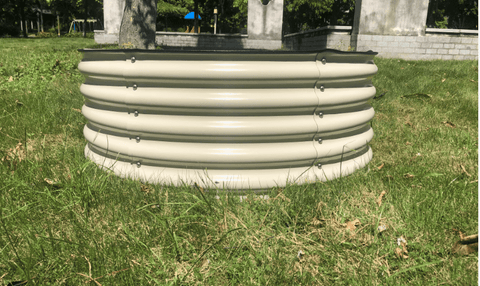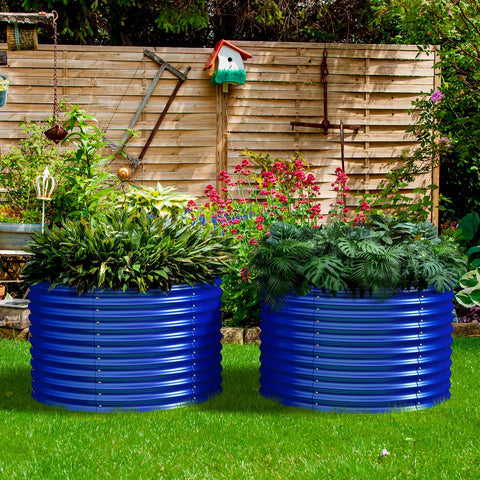Knowledge from Olle Garden Bed: Calcium Nitrate Fertilizer
Calcium nitrate fertilizer is a source of water-soluble calcium and nitrogen for planting plants. Also known as calcium ammonium nitrate (CAN), this fertilizer contains essential nutrients that help plants grow well. Plants that get the right amount of nitrogen and calcium produce better fruits and are more resistant to pests and diseases. You can apply calcium nitrate as foliar spray or soil fertilizer. The following content also has some reference value for raised garden beds.
What is calcium nitrate?
Calcium nitrate is the combination of calcium and ammonium nitrate, and ammonium nitrate is the source of nitrogen. This product, also known as calcium ammonium nitrate (CAN), is used as a nitrogen fertilizer in agriculture. Calcium nitrate can reduce soil acidity and improve soil absorption of calcium, potassium and magnesium. The advantage of using calcium nitrate as fertilizer is that it can simultaneously increase the level of calcium and nitrogen in plants to promote healthy growth.
Calcium nitrate fertilizer looks like small white to light gray particles, which are mixed with water before fertilizing plants.
The use of calcium nitrate spray fertilizers can help solve many plant growth problems. Nitrogen, together with phosphorus and potassium, is an important nutrient for plant growth. Calcium (Ca) is also essential for planting plants, because it can help plants grow healthy leaves, buds and fruits.

How is calcium nitrate made?
Calcium ammonium nitrate is a nitrogen fertilizer made by chemical process. The result is a tasteless particle that can be used to fertilize plants. To make calcium nitrate fertilizer for your garden, simply mix two to four tablespoons with a gallon (3.8 liters) of water and spray on the leaves.
Calcium nitrate fertilizer is composed of 15.5% nitrogen in the form of ammonium nitrogen and 19% calcium. As a fertilizer, the ratio of nitrogen, phosphorus and potassium (NPK) of calcium nitrate is 15.5-0-0+19% calcium.
Since calcium nitrate is the only water-soluble form of calcium, it is a necessary spray fertilizer to increase the level of nitrogen and calcium in plants.
When to use calcium nitrate fertilizer
Calcium nitrate is a useful fertilizer for pepper plants, tomatoes and other greenhouse crops. The use of calcium nitrate in hydroponics can "feed" plants growing in water and provide them with the necessary nutrients for growth. Some flowering garden plants, such as roses and gerberas, also benefit from calcium ammonium nitrate solutions.
Calcium is essential to plant health because it helps plants develop properly. Generally, calcium deficient plants have curly leaves and brown tips. Calcium deficient plants are also difficult to grow healthy flowers, and their fruits look and taste terrible.
Nitrogen is essential to plant photosynthesis and growth. Generally, nitrogen deficient plants grow slowly, with light and sparse leaves. However, only adding ammonium nitrate to solve the problem of nitrogen deficiency can inhibit the amount of calcium absorbed by plants. In other words, too much nitrogen leads to calcium deficiency.
Other scientific studies have shown that calcium deficiency can lead to reduced nitrogen absorption.
Plants benefiting from calcium nitrate fertilizer
You can use calcium nitrate fertilizer spray on most plants. Generally, fruit or vegetable plants benefit from calcium and nitrogen fertilizers. Some examples are apples, citrus trees, peppers, lettuce, eggplant, broccoli and spinach.
A study found that the use of calcium nitrate fertilizer can improve the quality and yield of some orange trees
Other research findings on the benefits of calcium nitrate fertilizers have shown that roses grown in hydroponic gardening produce better flowers and stronger stems. When applying calcium nitrate to gerbera plants, similar results were observed.

Benefits of calcium nitrate fertilizer
Applying calcium and nitrogen to plants can promote vigorous growth, healthy leaves and better fruits. Most gardeners realize that nitrogen is essential for growing lush green plants. However, calcium is equally important for promoting plant development and protecting them from disease.
Let's take a closer look at how calcium nitrate benefits garden and greenhouse plants.
Calcium nitrate helps prevent plant diseases
Calcium nitrate can increase the calcium content in plants, making them more robust and disease resistant. Calcium deficiency of fruit producing plants will lead to apple blossom end rot, cork spot and bitter stone. Spraying tomato plants or apple leaves with calcium nitrate can prevent calcium related growth problems.
The following are three common plant diseases that calcium nitrate can help avoid:
Cork spot is a common disease of apple trees, which is related to calcium deficiency. The cork spot looks like a discoloured dimple on an apple. This fruit disease can affect the appearance of apples.
If there is a potential calcium deficiency, bitter seeds will appear in apples. There are black spots on the skin and flesh of apples with bitter stones. These apples have a bitter taste that makes people lose their appetite.
The flower tip rot will affect many fruit plants, such as tomatoes, eggplants, peppers and pumpkins. With the growth of fruits and vegetables, they will grow rotten black ends and cannot be eaten.
Calcium nitrate fertilizer prevents calcium deficiency in plants
Calcium nitrate can be applied to soil or sprayed on leaves to prevent calcium deficiency. Calcium is an important element in soil. Plants need to absorb it to develop normally. In many cases, spraying calcium nitrate is more effective than adding it to the ground because it works faster.
Calcium deficiency is common in sandy or rough soils and is usually too acidic. In addition, the use of too much fertilizer will lead to underground calcium deficiency. It is also important to increase soil calcium levels from time to time.
Some plants are more prone to calcium deficiency. For example, heat stress consumes calcium levels in tomatoes. This leads to premature flower shedding, curly leaves, and end rot.
If your apple tree shows signs of calcium deficiency, then using ammonium calcium nitrate as a foliar spray can help solve the problem of cork spots or pits.
Calcium nitrate helps prevent nitrogen deficiency in plants
Nitrogen is one of the three main nutrients required for plant growth. The signs of nitrogen deficiency in plants are slow growth, no new growth, yellowing leaves and sparse leaves. Of course, you can add nitrogen rich fertilizer to solve the problem. But calcium nitrate fertilizer is more effective.
Excessive use of nitrogen in soil will inhibit calcium absorption by plants. Therefore, even if your soil appears to be rich in calcium, plants may be affected because they cannot absorb enough nutrients. Therefore, you can use calcium rich fertilizer (NPK15.5-0-0+19% Ca) to solve the nitrogen problem without affecting the calcium level.

How to use calcium nitrate fertilizer (calcium ammonium nitrate)
The best way to use calcium nitrate as fertilizer is to spray it on plant leaves. You can correct calcium and nitrogen deficiency by applying calcium ammonium nitrate in the soil; However, it will take a long time to be effective.
Before dealing with calcium deficiency in plants in greenhouses or gardens, it is best to test the soil. The simplest way is to buy a calcium (Ca2+) meter like this to check the calcium level.
Use calcium nitrate as a foliar spray to increase calcium and nitrogen levels. Mix 2 to 4 tablespoons of calcium nitrate with 1 gallon (3.8 liters) of water. Fill the pressure spray bottle with solution and spray a large amount of plants or leaves to correct calcium deficiency.
To use calcium nitrate in the soil, use about 1 pound (0.45 kg) of dry fertilizer per 100 feet (30 meters) of vegetable rows. Put calcium fertilizer into root growth zone. The area is then watered to help correct calcium and nitrogen deficiencies. Be careful not to let the powder come into contact with wet leaves.
